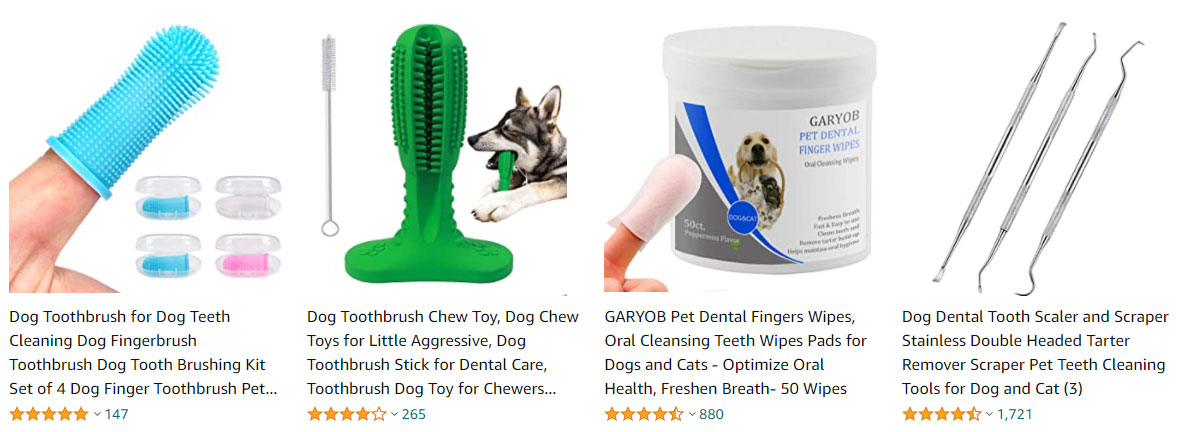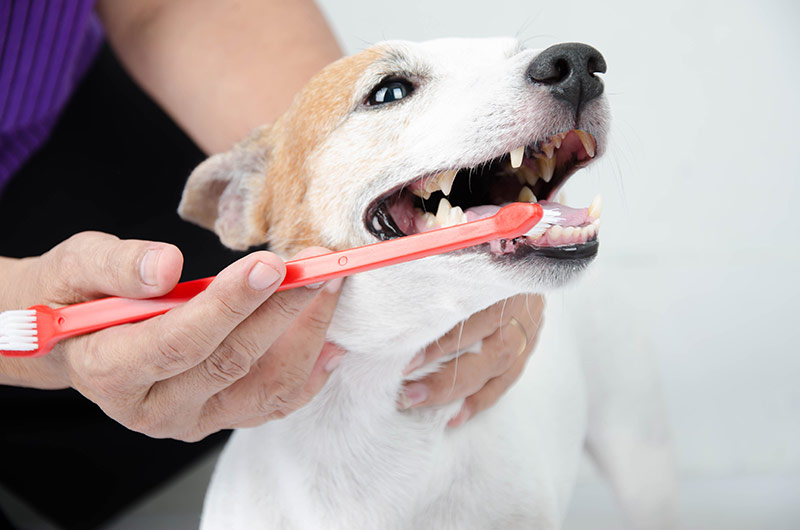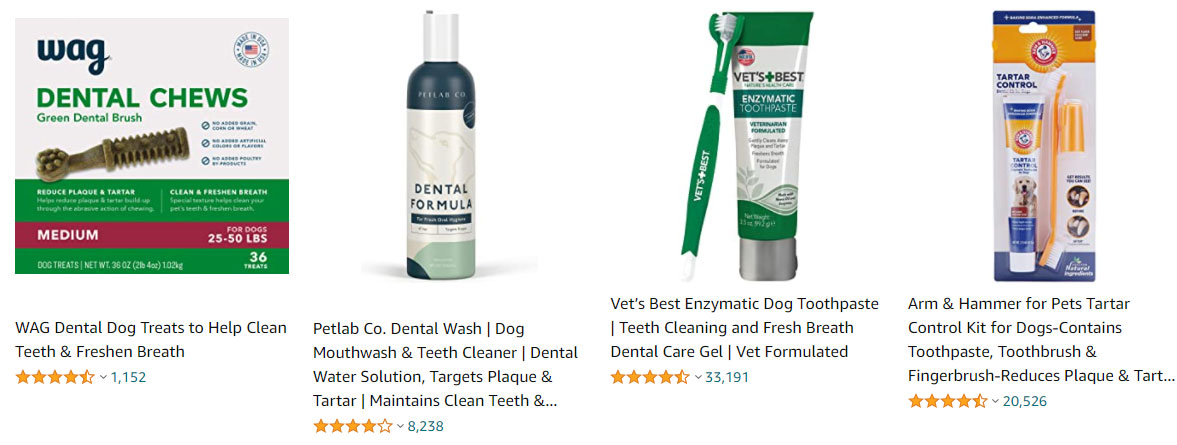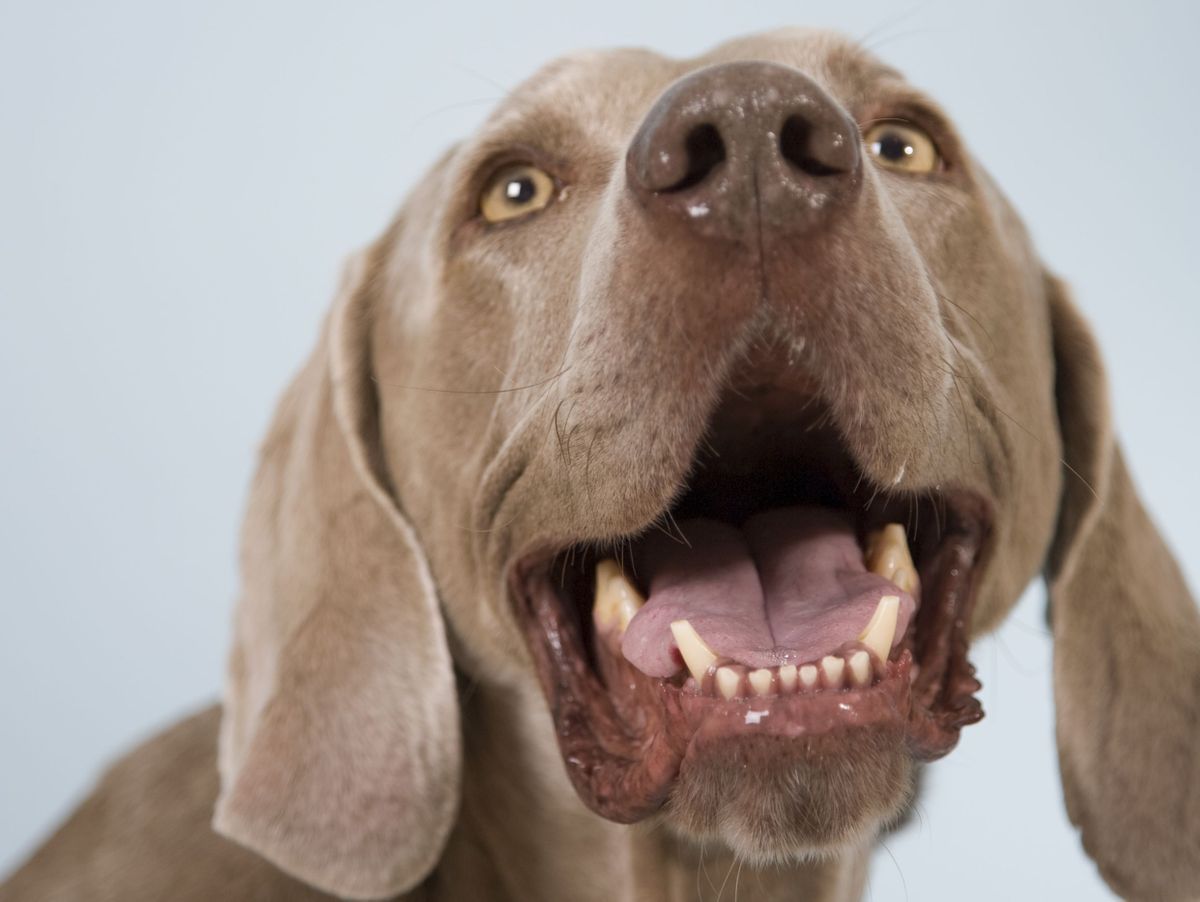Bad breath in dogs
Bad breath is a common occurrence in dogs, but it's important to distinguish between the "normal" unpleasant odors that can emanate from your dog's mouth and those that indicate a health problem.
Indeed, if a dog's mouth never smells very good, an unbearable bad breath is generally a sign that something is wrong with your four-legged friend. Today, I'd like to take a closer look at dog bad breath to find out what disorders can cause it, what their potential consequences are, and how best to deal with them.
What is bad breath in dogs?
Bad breath, also known as halitosis in medical jargon, doesn't really need to be defined: it's a problem that everyone knows about, especially dog owners - who rarely have fresh breath.
However, it is important to distinguish between "classic" bad breath, which has a moderately unpleasant odor, and severe halitosis, which has a truly unpleasant or even foul odor.
In fact, if your dog doesn't smell very good from his mouth, but doesn't bother you very much, it's likely that he doesn't have any particular problem and that the pronounced odor of his breath is only due to the fact that, unlike humans, he doesn't brush his teeth.
However, if you can smell his bad breath from a distance, or if his coat smells strongly after he grooms himself, or if his mouth has a deeply putrid or unusual odor, the situation is cause for concern.

Causes of bad dog breath
Dog breath odor, whether moderate or strong, is usually caused by bacteria that thrive in the dog's mouth. Since the dog's mouth is naturally home to many bacteria, it is normal for the dog's breath to have a moderately unpleasant odor at all times.
When these bacteria overgrow, bad breath becomes more pronounced and the dog's oral health is threatened. However, oral health problems are not the only cause of bad breath in dogs. Metabolic diseases, skin infections, behavioral disorders and perianal area diseases can also be the cause.
Oral and periodontal diseases
The most obvious cause of bad breath in dogs is oral and periodontal disease, which can affect the various tissues of the mouth. As mentioned earlier, the mere presence of bacteria in the animal's mouth, which is unavoidable under normal circumstances, can lead to unpleasant odors. Over time, these bacteria form plaque, a biofilm that calcifies into tartar, where they thrive.
Tartar buildup in the dog's mouth, beyond jeopardizing the health of the teeth and periodontal tissues, is commonly the cause of bad breath. When bacteria proliferate further, usually once the dog's teeth are full of tartar, new and more severe health problems can appear. This is the case for cavities, but also for gingivitis, dental abscesses or infections of the deep tissues of the periodontium (periodontitis).
Periodontitis can have serious repercussions on the health of the dog, leading to loosening of the teeth, lesions and even fractures of the mandibular bone, and in the most advanced cases, a fatal septicemia.
Metabolic diseases
Certain metabolic diseases, which cause changes in the body's chemistry, can cause bad breath that often has a very typical odor. Diabetes, which is common in dogs, typically produces a distinctive fermented apple smell on the breath. This is a result of diabetic ketoacidosis, a process that causes the release of acetone into the dog's breath.
Kidney disease, such as renal failure, which is just as common as diabetes in dogs, can cause "uremic" breath because of the increase in urea, a substance that should normally be filtered by the kidneys, in the blood. Uremic breath smells more or less like urine or ammonia, but some describe it as similar to the smell of fermented fish.
Digestive diseases
Dogs' bad breath is sometimes caused by the contents of their stomachs and the health of the various organs in their digestive tract. Slow digestion, for example, promotes fermentation of food in the dog's stomach, which can significantly affect its breath.
Digestive disorders can be due to the animal's diet, lifestyle (sedentary lifestyle slows down transit), metabolic diseases (cancer, pancreatitis, liver disease, etc.) or viral, bacterial or parasitic infections (gastritis, ulcer, gastroenteritis, etc.). Trauma and ingestions of foreign bodies can also cause damage to the digestive tract resulting in bad breath. In general, other symptoms are then associated with halitosis, particularly digestive (diarrhea, vomiting, etc.).
Respiratory Diseases
Bad breath in dogs can also be caused by respiratory tract infections, a possibility that owners think too little about. A dog's breath comes straight from its lungs, and bacteria growing in the upper or lower respiratory tract may be responsible for your pet's bad breath. Among respiratory diseases, sinusitis (sinus infection) is the most common cause of bad breath in dogs.
Skin diseases
Skin diseases are too often overlooked by owners looking for the cause of their dog's bad breath. Indeed, they can not only give off very unpleasant odors at a local level, as is the case with pyoderma of the folds of the lips, which spreads an infectious odor to the dog's mouth, or transmit their putrid odor to the animal's mouth when it licks its lesions, as can be the case with ringworm. It is also important to beware of ear infections and ear scabies, which can give off a completely unbearable odor that the owner may mistake for bad breath when the dog's entire head smells.
Perianal conditions
The best known perianal condition in dogs is undoubtedly inflamed anal sacs, which give the dog unbearable breath - usually compared to rotten fish - when he licks his hindquarters in an attempt to relieve the severe itching. Infected breath in a female dog should also raise the suspicion of a pyometra (uterine infection) when she frequently licks her genitals.
Behavioral Problems
Some dogs can develop very confusing behavioral problems, such as coprophagia, which is the practice of swallowing one's own feces - or those of other animals. As you can imagine, this type of habit gives dogs a terrible breath that is impossible to ignore. Overly gluttonous dogs, such as Beagles, can also be prone to compulsive eating of anything and everything, including rotting wildlife carcasses found on walks, which will inevitably give them jackal-like breath.

My dog has bad breath, what should I do?
If your dog has really bad breath that is bothering you, it is essential to take him to a veterinarian who will examine him in detail to find the cause of his halitosis. Your dog may have a metabolic disease that requires early treatment to give him a good prognosis.
Depending on the source of the problem, the veterinarian will implement a protocol to treat the problem at its source, whether it is a metabolic or digestive disease, inflammation of the anal sacs or simply tartar build-up. It is not advisable to brush your dog's teeth or add products to his water to treat his bad breath without first making sure that it is not caused by a health problem.
FAQ
Why does my dog have bad breath?
Dogs never have very fresh breath because their mouths - like humans' - are home to many bacteria that give off unpleasant odors. However, when your pet's breath suddenly becomes unbearable or very distinctive, it may be hiding a potentially serious health problem, such as diabetes, kidney failure or digestive disease. Because there are so many pathological causes of bad breath in dogs, it is highly recommended that you consult a veterinarian to find out for sure what is causing your four-legged friend's bad breath.
How do you treat bad breath in dogs?
Bad breath in dogs is relatively normal when it is moderate, and in this case should not require any special treatment. However, when it is very annoying, it is necessary to make sure that it is not caused by an underlying disease or by an excessive accumulation of tartar. The best thing to do is to take your pet to a veterinarian who will make sure your pet is healthy and determine if his breath is normal or hiding some kind of problem.
Why does my dog's breath smell like fish?
In general, strong rotten fish breath is typical of an infection of the dog's anal glands. You can tell by looking closely at your dog that he may be showing signs of discomfort and licking his hindquarters more often than usual. Also, his anal glands will usually be visibly red and swollen.
My dog has bad breath, should I brush his teeth?
If your dog has bad breath, you should first of all take him to a veterinarian to identify the cause of the problem and rule out potentially serious periodontal, digestive, respiratory or metabolic diseases. In fact, normally, a healthy dog never has very fresh breath, but it should not bother those around him.
Brushing your dog's teeth is a good solution to reduce the bad odor caused by tartar, but only if tartar is the cause. Bad breath is a common problem in dogs, but it can be a sign of serious, life-threatening health problems in your four-legged friend.
The safest course of action, although it may seem a bit daunting for such a seemingly trivial problem, is to take your dog to the veterinarian to make sure he or she is not suffering from periodontal, metabolic, respiratory or digestive disease.
If your dog does not suffer from any particular health problem, it is possible that his diet is at fault and that you should opt for a healthier diet to improve his dental hygiene and, therefore, his breath.


